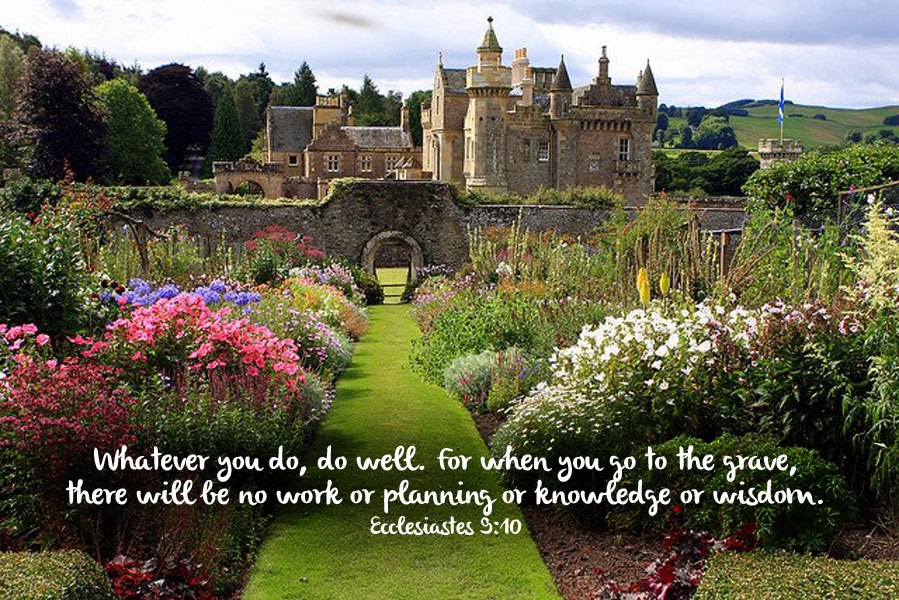Before we leave the introduction to Peter’s first letter, I wanted to talk a little bit about peace.
“Peter, an apostle of Jesus Christ,
To God’s elect, strangers in the world, scattered throughout Pontus, Galatia, Cappadocia, Asia and Bithynia, who have been chosen according to the foreknowledge of God the Father, through the sanctifying work of the Spirit, for obedience to Jesus Christ and sprinkling by his blood:
Grace and peace be yours in abundance” (1 Peter 1:1-2).
Over the past few weeks, we talked a lot about the grace of God in bringing His salvation to the entire world, but Peter writes that he hopes his readers would have an abundance of peace as well. John wrote something similar in his third letter:
“Dear friend, I pray that you may enjoy good health and that all may go well with you, even as your soul is getting along well” (3 John 1:2).
Sometimes we skim over these introductory remarks, hoping to quickly dig into something a little more spiritual. But if every word of Scripture that these apostles penned is inspired, then I thought maybe I’d take a little time to look at this “peace.”
You see, those who had been dispersed all over the world, “scattered throughout Pontus, Galatia, Cappadocia, Asia and Bithynia,” were eagerly awaiting the day when God would bring them back to the land of Israel as He had promised.
“But in keeping with his promise we are looking forward to a new heaven and a new earth, the home of righteousness” (2 Peter 3:13).
Paul wrote much in his letters about the return of Jesus as well (see 1 Thessalonians 4:13-5:11). Paul, however, emphasized that, at least in his time, Jesus couldn’t return until certain events happened first.
“Concerning the coming of our Lord Jesus Christ and our being gathered to him, we ask you, brothers, not to become easily unsettled or alarmed by some prophecy, report or letter supposed to have come from us, saying that the day of the Lord has already come. Don’t let anyone deceive you in any way, for that day will not come until the rebellion occurs and the man of lawlessness is revealed, the man doomed to destruction” (2 Thessalonians 2:1-3).
How discouraging it must have been to hear that they had to wait a little longer! I know how much I long for Jesus’ return! We sing songs about His return. We watch the news and ache for a world with less sin and pain. We dream of His kingdom being set up and can only imagine what it will be like. We say, “Even so come, Lord Jesus!”
It was no different during the life of Jeremiah, when his Jewish friends and family were dispersed into the land of Babylon. They also longed to be returned to their land. In fact, many prophets arose who said, “It will be very soon! Be ready at any moment to return to the Land of Israel!”
But God sent a message to them, through His prophet Jeremiah:
“When seventy years are completed for Babylon, I will come to you and fulfill my gracious promise to bring you back to this place” (Jeremiah 29:10).
Seventy years? That’s a lifetime! In fact, for most of the adults, that would be past a lifetime. They could die in the dispersion? They might never see the land again?
Yes, that’s exactly what God was saying. In fact, because of this, He gave them some specific instructions.
“This is what YHWH Almighty, the God of Israel, says to all those I carried into exile from Jerusalem to Babylon:
‘Build houses and settle down; plant gardens and eat what they produce. Marry and have sons and daughters; find wives for your sons and give your daughters in marriage, so that they too may have sons and daughters. Increase in number there; do not decrease.
Also, seek the peace and prosperity of the city to which I have carried you into exile. Pray to the Lord for it, because if it prospers, you too will prosper'” (Jeremiah 29:4-7).
Do you see that they were to “seek the peace and prosperity” of the city where they lived? Even Babylon, that evil city, the “home for demons and a haunt for every evil spirit, a haunt for every unclean and detestable bird”?
Yes, even in Babylon. And I note that Peter, when writing to the dispersed believers of the first century, wrote that he wanted them to have “grace and peace in abundance.”
As we go further into his letter, we’ll note that he doesn’t tell them to pack up their homes and move back to Israel. Nor does he tell them to avoid the coming persecution of believers by homesteading on the back mountains of the Black Sea, far from civilization. He doesn’t tell them to hide, or to remove themselves from society, or to cower in fear over the state of the government in pagan, idolatrous Rome.
Rather, he’s going to get really practical. He’s going to tell them how to do their work well, how to have lives above reproach in their society, how to submit to kings and governors, how to be good slaves and even endure beatings, how to have a good marriage, how to pastor churches with loving care and service, and even how to bear up under intense persecution.
In Peter’s second letter, he tells them that it could be a long time before Jesus returned. Why? Because God “is patient with you, not wanting anyone to perish, but everyone to come to repentance” (2 Peter 3:9). In other words, it might be a lot longer than 70 years!
Over 1900 years have come and gone since Peter’s letter, but Jesus has not yet returned. Many Israelites are still dispersed throughout the nations, and we Gentiles who have been grafted in also remain with them in dispersion. Signs seem to indicate that the return of our Lord is near, but will it be this year? Will it even be within 70 years?
Our nation is pagan and idolatrous. Should we pack up our homes and move back to Israel? Should we avoid persecution by homesteading on the back mountains of Montana, far from civilization? Should we hide, or remove ourselves from society, or cower in fear over the state of the government?
No, let’s get practical. Peter hopes for us to have “peace… in abundance.” Jeremiah went into more detail about how to seek that peace while dispersed in a pagan land.
“Seek the peace and prosperity of the city to which I have carried you into exile. Pray to the Lord for it, because if it prospers, you too will prosper” (Jeremiah 29:4-7).
Let’s start there. Scripture says to seek the peace and prosperity of the city to which God has called us. For our family, God recently called us to live outside the Twin Cities. Over 3.28 million call these gorgeous cities home, which is a big change from the little town of 600 where we used to live. As I drive into the Cities, I see skylines as well as trees, rolling hills, and growing subdivisions with the new homes being built each day.
I am to seek the peace of the Twin Cities.
Peace is the Hebrew word shalom. My friend Posey writes that shalom means “to break or destroy the authority that binds us to chaos.”
“Turn from evil and do good; seek shalom and pursue it” (Psalm 34:14).
“Shalom I leave with you; my shalom I give you. I do not give to you as the world gives. Do not let your hearts be troubled and do not be afraid” (John 14:27).
“The mind of sinful man is death, but the mind controlled by the Spirit is life and shalom“ (Romans 8:6).
When I seek shalom for myself and for my city, I seek to break the authority of the Evil One that holds such power over us. I seek to lead people away from chaos in their lives. Can you see where this could get intensely practical?
How can I lead my culture away from Satan and to the Prince of Peace? How can I help them overcome the chaos of sinful living and see their lives filled with abundant grace and peace? (I think you can see where I’m going with this….)
Here are some ways that Scripture says I can help the Twin Cities prosper with the peace (shalom) of God:
Pray for Babylon My City
Yes, Jeremiah said to “pray to the Lord for it, because if it prospers, you too will prosper” (Jeremiah 29:7). Paul also wrote,
“I urge, then, first of all, that requests, prayers, intercession and thanksgiving (gasp!) be made for everyone — for kings and all those in authority, that we may live peaceful (shalom-filled) and quiet lives in all godliness and holiness. This is good, and pleases God our Savior, who wants all men to be saved and to come to a knowledge of the truth (even Barack Obama)” (1 Timothy 2:1-4).
And he also wrote,
“Pray that we may be delivered from wicked and evil men, for not everyone has faith” (2 Thessalonians 3:2).
Settle into Homes
“Build houses and settle down; plant gardens and eat what they produce” (Jeremiah 29:5).
From this I see that it is entirely appropriate for us women to act like the excellent wife of Proverbs 31. It’s appropriate and good to spend time on Pinterest, planning our homes and gardens and pinning new recipes. It’s God’s will for us to settle, even though we are told in Hebrews to “long for a better country — a heavenly one” (Hebrews 11:16).
As we women do an excellent job of settling in our homes, we are helping the peace and prosperity of the cities around us, which is God’s will for us in this time of dispersion.
Have Children
“Marry and have sons and daughters; find wives for your sons and give your daughters in marriage, so that they too may have sons and daughters. Increase in number there; do not decrease” (Jeremiah 29:6).
Maybe we feel like large families are a burden to the economy, but that’s not what God’s Word says (Ezekiel 36:11)! He always says that children are a blessing — especially godly children who, like arrows in the hand of a mighty warrior, are aimed to take the Gospel of God into our heathen culture (Psalm 127:3-5).
Let’s train our children properly, educate them well, help them find godly spouses, and seek the peace and prosperity of our cities by the noble task of mothering!
Prosper Financially
“‘For I know the plans I have for you,’ declares YHWH, ‘plans to prosper you and not to harm you, plans to give you hope and a future'” (Jeremiah 29:11).
The Psalmist says that as we are obedient to YHWH’s commands, He will make us prosper.
“He is like a tree planted by streams of water,
which yields its fruit in season
and whose leaf does not wither—
whatever he does prospers” (Psalm 1:3).
One we can prosper the economies of the cities in which we live is by avoiding debt.
“When the righteous prosper, the city rejoices” (Proverbs 11:10).
God says that debt is the opposite of prosperity. Debt brings the opposite of shalom, and instead it brings chaos and slavery.
‘The rich rule over the poor, and the borrower is servant to the lender” (Proverbs 22:7).
“Let no debt remain outstanding, except the continuing debt to love one another…” (Romans 13:8).
Rather, we are to be industrious and hard working, inventive and creative in the image of our Creator.
“She selects wool and flax
and works with eager hands.
She is like the merchant ships,
bringing her food from afar.
She gets up while it is still night;
she provides food for her family
and portions for her female servants.
She considers a field and buys it;
out of her earnings she plants a vineyard.
She sets about her work vigorously;
her arms are strong for her tasks.
She sees that her trading is profitable,
and her lamp does not go out at night.
In her hand she holds the distaff
and grasps the spindle with her fingers.
She opens her arms to the poor
and extends her hands to the needy.
When it snows, she has no fear for her household;
for all of them are clothed in scarlet.
She makes coverings for her bed;
she is clothed in fine linen and purple.
Her husband is respected at the city gate,
where he takes his seat among the elders of the land.
She makes linen garments and sells them,
and supplies the merchants with sashes” (Proverbs 31:13-24).
Barnes wrote, in his commentary of Jeremiah about the desire of the people of Judah to return to the Land, “if they were always restlessly looking out for the opportunity of returning home, they would rapidly fall into poverty.”

Photo from Christine Miller, Christine’s Bible Study
I see this among believers today, too. It’s fine to look to the skies in anticipation of the Lord’s return, but if we’re always restlessly looking out for His coming, never applying ourselves with industry to the tasks God has given us right here, we also will rapidly fall into poverty!
“Make it your ambition to lead a quiet life, to mind your own business and to work with your hands, just as we told you, so that your daily life may win the respect of outsiders and so that you will not be dependent on anybody” (1 Thessalonians 4:11-12).
Give to the Poor
Each of us will contribute to the peace and prosperity of our cities and their economies if we will simply show love and mercy to the poor. Yes, even those of us who are poor ourselves!
The Scriptural principle, taken from the Torah, is that we should set aside 10% of all God prospers us with, every three years. This works out to about 3% of our income, or 3% of the extra tomatoes our gardens produce, or an hour and a half of our working time each week given as a donation to those who need our help. That’s a minimum.
“A generous man will prosper; he who refreshes others will himself be refreshed” (Proverbs 11:25).
But going above numbers, we shouldn’t have an “evil eye” of greed (Matthew 6:23-24), but rather we should be generous to all, especially to widows and orphans, to those who teach the Word of God to us while still laboring to put food on their own tables, to immigrants, to new believers who struggle with the financial consequences of their past, to those in prison for the sake of the gospel, to apostles (missionaries, or “sent ones”) who are taking the gospel to places we cannot go, to the aged, to the sick…. and the list goes on and on.
Share the Gospel
The number one way we can seek the peace and prosperity of our cities is to share the gospel! Yes, the number one way! Why is this? Because only when our cities turn to their Messiah and repent of their sin, changing their evil and becoming obedient to His commands, will our cities really prosper!
Sometimes we don’t love our cities. We’re more like Jonah. We’d rather see God’s wrath come upon them. (Come on… admit it…)
Like Jonah, we’re more concerned about our own comfort than we are about those who will surely die if Jesus returns in judgment before they repent!
“But YHWH said [to Jonah], ‘You have been concerned about this plant, though you did not tend it or make it grow. It sprang up overnight and died overnight. And should I not have concern for the great city of Nineveh, in which there are more than a hundred and twenty thousand people who cannot tell their right hand from their left (children) — and also many animals?'” (Jonah 4:10-11).
Are there 120,000 children who aren’t old enough to tell their right hand from their left in your city? Wikipedia tells me there were 233,600 children under the age of 5 in Minneapolis alone in the year 2000! That’s not counting the greater metro area.
Who will reach these children with the gospel? Who will reach their moms and dads, their grandparents, their mothers’ live-in-boyfriends, and those who don’t even have children?
“But there are plenty of churches,” you may say.” Let the mega churches reach the lost! I’d rather meet in a small Bible study in my home each week. I can’t agree with anyone else theologically, and I get tired of trying to get along with ornery people!”
And I respond as Paul did,
“How, then, can they call on the one they have not believed in? And how can they believe in the one of whom they have not heard? And how can they hear without someone preaching to them? And how can they preach unless they are sent? As it is written: ‘How beautiful are the feet of those who bring good news!'” (Romans 10:14-15).
You see, we live in the age of grace… the Church age… the times of the Gentiles… the Dispersion… Whatever you want to call it, God’s purpose for these thousands of years between Christ’s two comings is for one reason.
“I have other sheep that are not of this sheep pen. I must bring them also. They too will listen to my voice, and there shall be one flock and one shepherd” (John 10:16).
“It is not for you to know the times or dates the Father has set by his own authority. But you will receive power when the Holy Spirit comes on you; and you will be my witnesses in Jerusalem, and in all Judea and Samaria, and to the ends of the earth” (Acts 1:7-8).
So are you doing your job, seeking the peace and prosperity of your city by taking the gospel into your neck of the woods?
If you don’t have a good church, are you starting one?
If you know a child without Jesus, are you getting to know him better?
Are you feeding the poor — both physically and spiritually?
Are you content with the mission given to you during this moment, while waiting for His return?
“I tell you, use worldly wealth to gain friends for yourselves, so that when it is gone, you will be welcomed into eternal dwellings.
Whoever can be trusted with very little can also be trusted with much, and whoever is dishonest with very little will also be dishonest with much. So if you have not been trustworthy in handling worldly wealth, who will trust you with true riches? And if you have not been trustworthy with someone else’s property, who will give you property of your own?
No one can serve two masters. Either you will hate the one and love the other, or you will be devoted to the one and despise the other. You cannot serve both God and money” (Luke 16:9-13).
![]()



Wow, that is a heavy message. I have never thought of peace coming through my actions, but rather as a gift from the LORD through Christ when I trust in Him. You put a lot in this post for me to think on.
Well, I think you’re right. Peace IS a gift from Him when we trust Him in our circumstances, and we can also have peace WITH Him because of Jesus. These verses today are from all the pondering about the Dispersion I’ve been doing over the past month or so. And watching people filled with fear, dread, or even no concern at all about the coming of the Lord. And wondering what response is right. And thinking about our move… and why we moved…. and all those other thoughts that come late at night or in the shower each morning. lol! (((hugs)))
We are citizens of the kingdom. Where we live physically is irrelevant, in my opinion. Bloom where you’re planted.
I wish I lived in sunny Florida. But we are where God wants us!
Anne,
Lovely thoughts here.
Just wanted to share a little more information about giving from a Hebraic perspective: http://poseysplace.com/tzedakah-giving-to-others/
Luv you dear sister,
Posey
I note that in your article you did not really address the reason for seeking peace for our city.
Jeremiah 29: 7 “because if it prospers, you too will prosper.”
Seeking the cities peace is not an end to itself, but is connected to the redemptive plan of God being found in His people’s prosperity spiritually as well as numerically.
Concerning real life examples of God’s people seeking the cities shalom, John piper writes:
“Thankfully, the Scriptures provide us with the next chapter. It’s called the book of Daniel. The first half of the book is a basic narrative about Daniel and three friends as they seek to live out the Jeremian call to “seek the good of the city.” However, those who call for Christians to seek the good of the city by embedding ourselves in its institutions, and pursuing God’s justice, often fail to reckon with the fact that two of the main instances of this do-gooding in the Bible resulted in a lion’s den and a fiery furnace. Apparently some Babylonians don’t find our do-gooding to be all that good.”
If the cities peace were believers final objective, they failed!